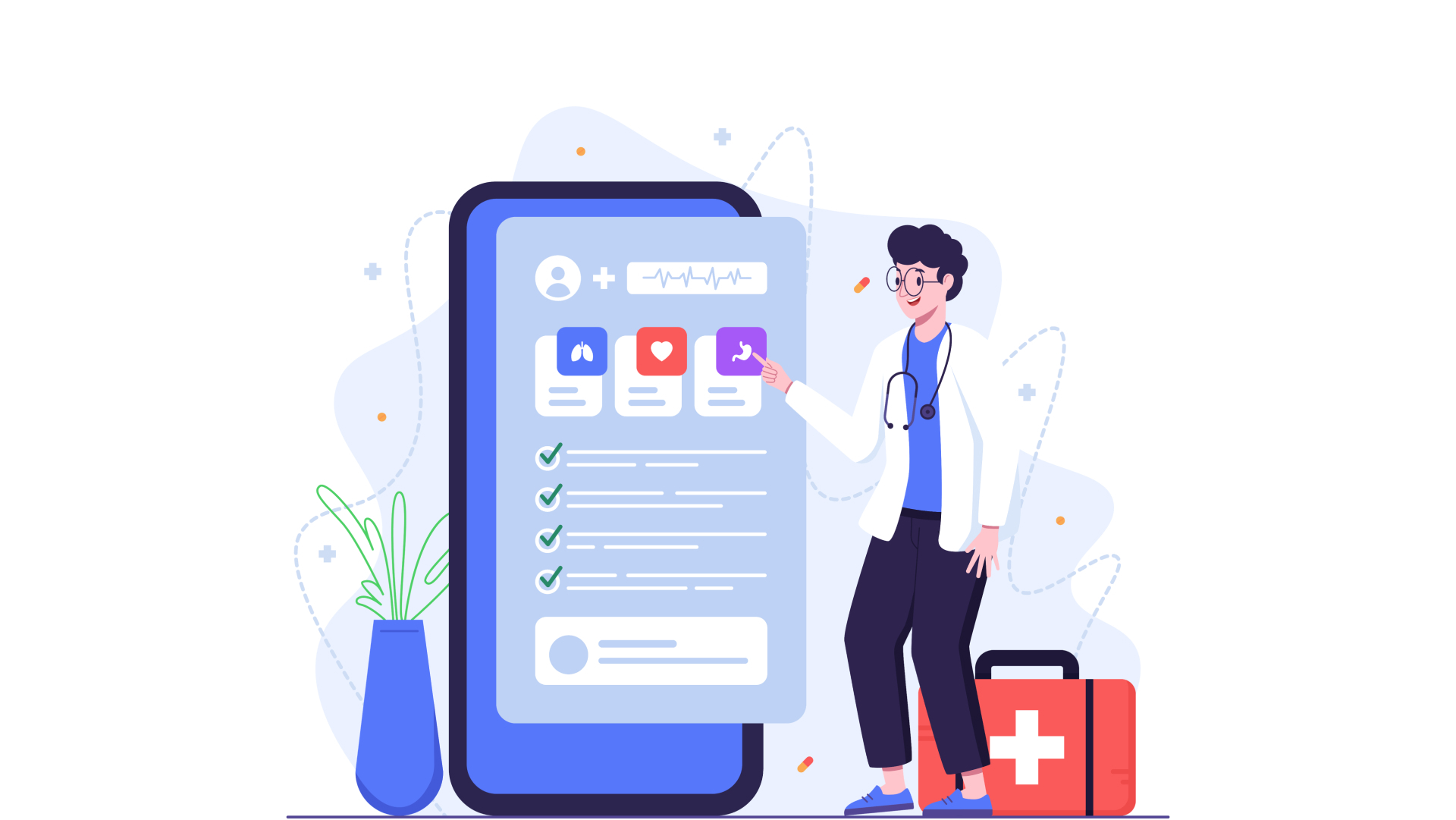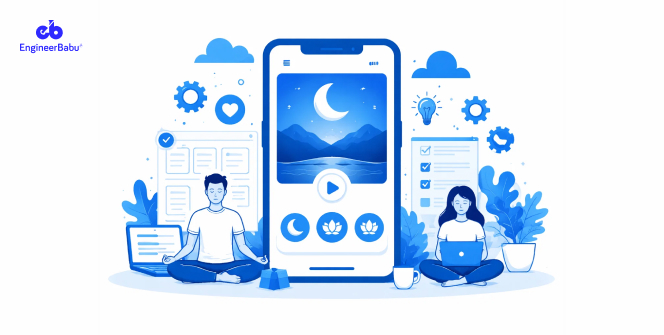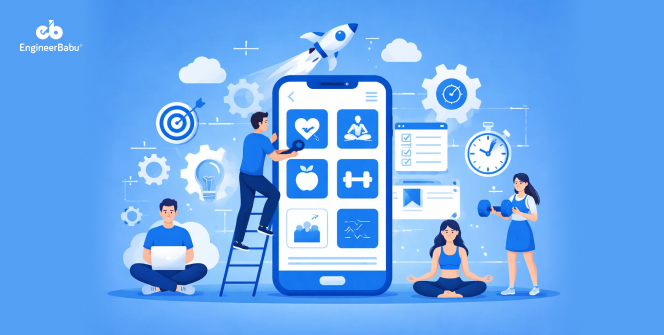Imagine walking into a doctor’s office and having your entire medical history, prescriptions, and appointment schedule available on your phone, ready to share with your provider in seconds. In current times, this isn’t just an ideal—it’s becoming the expectation. Healthcare is rapidly evolving, and providers who don’t adapt risk falling behind.
A recent survey found that nearly 72% of patients now expect personalized care through digital tools, and mobile apps are at the heart of that transformation. Custom apps are no longer a luxury—they’re a necessity for healthcare providers aiming to stay relevant, efficient, and responsive to today’s tech-savvy patients.
So, why exactly do healthcare providers need a custom healthcare app? Let’s dive into the specific benefits and how these tailored solutions are reshaping patient care and provider operations.
The Evolution of Healthcare in the Digital Era
Healthcare has come a long way from paper charts and handwritten prescriptions. In fact, a 2023 study revealed that 89% of healthcare organizations in the US had already adopted electronic health records (EHRs), a significant leap from just a decade ago.
But the digital shift isn’t stopping there. We’re now seeing an explosion of mobile technologies, wearables, and telemedicine services that are transforming how patients engage with their healthcare providers.
With people becoming used to digitization, the expectation is clear: healthcare needs to be smarter, faster, and more accessible. Custom apps are at the forefront of this change, offering healthcare providers the tools to meet these new demands.
Patients are now expecting more seamless and personalized experiences. That is why, it’s no longer enough to rely on generic solutions. Custom-built apps offer exactly what healthcare providers need—tailored features that fit their specific workflow, patient base, and objectives.
Understanding the Role of Custom Apps in Healthcare
A custom healthcare app is built specifically to fit the unique needs of a healthcare provider, whether it’s a small clinic or a large hospital network.
Unlike generic, off-the-shelf software that often forces you to work around its limitations, a custom app is designed to integrate seamlessly with existing systems—like EHRs—and adapt to the needs of both medical teams and patients.
Take a dermatology practice, for example. A custom app could allow patients to share photos for remote consultations, track their treatment progress, and even sync with wearable devices to monitor skin conditions in real time.
These specialized features wouldn’t be available in a one-size-fits-all app.
By building a solution tailored to their exact needs, healthcare providers can offer more efficient, accurate, and personalized care—without the compromises.
Key Benefits of Custom Healthcare Apps
Enhanced Patient Experience
Patients today want convenience, and a custom app makes it easy for them to access their health information whenever they need it. A study found that 70% of healthcare consumers prefer using digital tools for appointment scheduling, prescriptions, and health tracking.
Custom apps take this a step further, allowing patients to not only book appointments but also receive notifications about upcoming visits, medication refills, and lab results—all from their smartphones.
For example, a custom app could integrate with telemedicine services, enabling patients to have virtual consultations with their healthcare providers from the comfort of their homes, reducing wait times and improving satisfaction. In a time when convenience is paramount, the ability to manage healthcare from a phone is a game-changer.
Improved Operational Efficiency
Healthcare is a fast-paced environment where time is of the essence. A custom app can significantly reduce administrative burdens by automating routine tasks like scheduling, billing, and patient intake forms. This means healthcare staff can focus on providing care rather than spending time on paperwork.
A study found that automating administrative tasks could save healthcare providers up to $11 billion annually. Custom apps help achieve these savings by streamlining processes and reducing human error.
Increased Security and Compliance
Healthcare data is one of the most sensitive types of information, and ensuring that it’s protected is a top priority. Custom apps are designed with security and compliance in mind, ensuring they meet standards like HIPAA (Health Insurance Portability and Accountability Act) regulations, which protect patient privacy.
In fact, according to a 2024 report by Proofpoint, 92% of healthcare organizations experienced at least one cyberattack in the past 12 months, up from 88% in 2023.. With a custom app, healthcare providers can implement end-to-end encryption, multi-factor authentication, and other security features that help mitigate risks and keep patient data secure.
Personalization
One of the biggest advantages of a custom app is the ability to provide personalized care. For instance, a custom app could offer patients personalized reminders for medication, lifestyle changes, or follow-up appointments based on their individual health needs.
Imagine a custom app for a cardiac clinic that sends reminders to patients to check their blood pressure or take their prescribed medications. This level of personalization not only helps improve patient outcomes but also fosters stronger patient-provider relationships.
Patient-Centered Care
Healthcare is increasingly patient-centered. Patients expect more control over their healthcare decisions and prefer providers who offer digital tools that allow them to actively engage in their care.
Custom apps are the perfect platform for this, allowing patients to access everything from test results to personalized health tips and appointment reminders—all in one place. They can also help with:
- Chronic Condition Management: Custom apps provide patients with tools to monitor chronic conditions like diabetes or hypertension. For example, apps can sync with wearables to track blood glucose levels and share real-time data with providers.
- Preventative Care: Apps can send reminders for screenings, vaccinations, or lifestyle changes, encouraging proactive health management.
- Telemedicine for Accessibility: Patients who live in rural areas or have mobility issues can access care remotely through telehealth features, reducing barriers to healthcare.
The Competitive Advantage of Custom Apps
With more healthcare providers adopting digital solutions, the competition is heating up. In fact, 62% of healthcare executives believe digital tools, including mobile apps, are essential to maintaining a competitive edge. Providers who invest in custom apps now will be better positioned to attract and retain patients in the future.
For instance, a custom app that offers telehealth services and integrates seamlessly with a provider’s EHR system can help a healthcare practice stand out from the competition.
Patients who value convenience and personalized care are more likely to choose a provider who offers these advanced features, making custom apps a key differentiator in today’s crowded healthcare market.
Challenges in Developing Custom Healthcare Apps
There’s no doubt that custom healthcare apps can transform patient care and streamline operations, but building one isn’t always easy. Many healthcare providers face hurdles that can slow down or complicate the development process. Here are some of the biggest challenges:
High Development Costs
Creating a custom healthcare app takes a serious investment. From hiring skilled developers to making sure the app meets strict security and compliance standards, costs can add up quickly. This can be especially tough for smaller clinics and hospitals working with limited budgets. Many providers hesitate to invest in digital solutions because they worry about affordability, even though a well-built app can lead to long-term savings.
Regulatory Compliance & Data Security
Handling patient data comes with a lot of responsibility, and healthcare apps need to meet strict regulations like HIPAA (USA), GDPR (Europe), and PIPEDA (Canada). Navigating these complex rules can be overwhelming, and failing to comply can result in hefty fines and loss of patient trust. On top of that, developers need to implement strong encryption, secure authentication, and strict access controls to keep patient information safe from cyber threats.
Complexity & Scalability
A healthcare app can’t exist in isolation—it needs to connect smoothly with existing systems like Electronic Health Records (EHRs), telehealth platforms, wearable devices, and even insurance systems. Getting all these integrations right can be tricky. Plus, as the healthcare organization grows, the app must be able to handle more patients, more data, and new features without crashing or slowing down.
How EngineerBabu Can Help
EngineerBabu is a trusted IT service provider, offering end-to-end solutions for businesses looking to build secure and scalable applications. Our in-house team of expert developers specializes in building HIPAA-compliant apps, ensuring healthcare organizations meet strict regulatory standards while delivering seamless digital experiences.
When it comes to compliance and security, Engineerbabu has it covered. Their developers stay up to date with the latest HIPAA, GDPR, and other regulatory requirements, ensuring that every app is built with strong security measures to protect patient data.
Plus, they don’t just build an app and leave you to figure out the rest—they focus on seamless integration, making sure the app works smoothly with existing systems like EHRs, telehealth platforms, and wearable devices.
By partnering with EngineerBabu, healthcare providers can skip the usual headaches and get a secure, reliable, and scalable app that truly meets their needs—without the stress of managing the development process alone.
Examples of Successful Custom Healthcare Apps
Are you still not sure about getting a custom healthcare app? Let these examples show why you and your customers both need a custom healthcare app.
HealthifyMe – AI-Powered Nutrition & Fitness Coaching
HealthifyMe is a health and wellness app that helps users track their diet, exercise, and overall fitness. It offers personalized meal plans, AI-driven coaching, and integrations with wearables to monitor progress. Many users, like Lakshmi Rao, a 65-year-old professor, have seen significant health improvements, including weight loss and better diabetes management. The app’s smart coaching has led to a 90% boost in user engagement within just six months.
Lark Health – AI-Powered Chronic Care Management
Lark Health is a virtual health coach designed to help people manage chronic conditions like diabetes and high blood pressure. Instead of a traditional app experience, Lark uses AI-powered chat to provide real-time health coaching. The platform’s Diabetes Prevention Program is even recognized by the CDC. Users say it helps them stay motivated with daily check-ins and small lifestyle adjustments that make a big difference over time.
Doxy.me – Simplifying Telemedicine
Doxy.me is a super simple telemedicine platform that lets healthcare providers conduct video consultations with patients—without requiring any downloads. It became especially popular during the COVID-19 pandemic, growing from 80,000 to 700,000 healthcare providers in just two months. Its ease of use and secure setup have made it a go-to choice for doctors looking to offer virtual care without technical headaches.
How to Get Started with a Custom Healthcare App
If you’re a healthcare provider considering a custom app, the first step is to identify your goals. What problems are you trying to solve? Do you want to streamline scheduling, improve communication, or enhance patient care? Once you’ve defined your objectives, the next step is to choose a development partner who has experience working in the healthcare industry and understands the regulatory landscape.
Budgeting for a custom app is also important. While it can be a significant upfront investment, the potential savings and improvements in patient retention make it a worthwhile long-term commitment. With the right team and a clear plan, building a custom app can transform how your practice operates and how your patients experience care.
Conclusion
Having a custom healthcare app isn’t just a nice-to-have—it’s a must. Patients expect convenience, personalization, and easy access to their healthcare, and providers who don’t keep up risk falling behind. When it comes to simplifying appointment booking, improving communication, or ensuring better patient engagement, a well designed app can make a huge difference.
Yes, developing a custom app comes with its challenges, but the benefits—happier patients, smoother operations, and stronger security—make it well worth the investment. Plus, with the right development partner, the process doesn’t have to be overwhelming.
Healthcare is changing fast, and digital tools are leading the way. A custom app can help future-proof your practice, keep patients engaged, and set you apart from the competition. The question isn’t whether you need one—it’s how soon you’re ready to get started.
FAQs
Why do healthcare providers need a custom app instead of using off-the-shelf solutions?
Off-the-shelf apps may offer basic functionality, but they often come with limitations. A custom app is built specifically for your practice’s needs, ensuring seamless EHR integration, regulatory compliance, and personalized features that improve both patient care and operational efficiency.
How much does it cost to develop a custom healthcare app?
The cost varies depending on the complexity, features, and compliance requirements. While custom apps require an upfront investment, they can lead to long-term savings by streamlining operations, reducing administrative costs, and improving patient retention.
How do custom healthcare apps improve patient engagement?
A well-designed app gives patients easy access to their medical records, appointment scheduling, telehealth services, medication reminders, and personalized health insights. This level of convenience enhances patient satisfaction and encourages proactive healthcare management.
What security measures should a healthcare app have?
Since healthcare apps handle sensitive patient data, they must comply with HIPAA, GDPR, and other regulations. Key security features include end-to-end encryption, multi-factor authentication, secure cloud storage, and regular security audits to protect patient information.
How can Engineerbabu help healthcare providers develop a custom app?
Engineerbabu connects healthcare providers with top-tier, pre-vetted development teams who specialize in healthcare technology and compliance. They help you build a secure, scalable, and cost-effective custom app without the hassle of managing the development process on your own.



